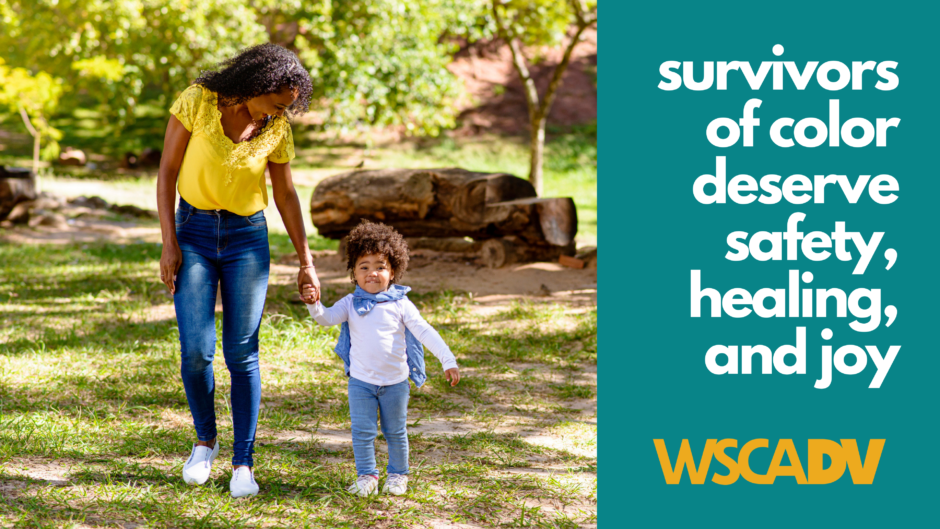
Our nation is in a time of seemingly endless upheaval and change. Over the past few months, communities around Washington have held the joy and celebration of Juneteenth, Pride Month, and policy wins that provide cash assistance to Washington survivors and their families. And they have felt the deep grief of the shootings in Buffalo and Uvalde, the Federal Indian Boarding School Initiative’s Investigative Report release, the Supreme Court’s overturning of Roe v. Wade, and a surge of legislation across the country that seeks to erase and criminalize trans people and their families.
As we process the grief and fear around so many of us, it is clear that each of these issues, challenges, and tragedies present unfair and disparate impacts on survivors, advocates, and communities of color. The violence that unfolded in Buffalo in May and the violence documented in the Federal Indian Boarding Schools report is rooted in the same violence, threats, and fear that Black and Indigenous communities experience every day throughout our state and our nation. Survivors of color—and all survivors—deserve safety, healing, and joy. Ending domestic violence is inextricably linked to ending all inequalities that cause harm, including systems of racism.
The systems and structures that are available to help survivors and hold abusive people accountable also hold histories of treating survivors of color and Indigenous survivors unfairly – even harming them – and undervaluing women, girls, and trans people. And this unfairness is not just in the past but is creating barriers and harming survivors today. Many survivors face increased violence or other negative outcomes from contact with the criminal legal system. When survivors of color and Indigenous survivors seek help from the legal system, for their family’s healthcare needs, or from the child welfare system, the reality of racist and sexist systems means that they can’t count on getting help and could suffer harm. When a survivor of color is considering calling 911, she does not know if that call will bring safety or more danger – even her death. When the child welfare system intervenes due to the abuser’s violence, survivors risk losing their children to foster care. The abuse-to-prison pipeline is a leading reason why women are the fastest growing incarcerated population.
In 2020, WSCADV and 45 other coalitions across the nation convened a Moment of Truth to reckon with our movement’s failures to meaningfully confront racism, and to affirm our commitment to Black Lives. A statement is only a starting point – we all must also continue to do the work of undoing racism and uplifting Black, Indigenous, and People of Color survivors, advocates, leaders, and organizations every day. These communities have always worked to end violence and exploitation of women, children, and trans people on this land because they know it goes hand in hand with freedom.
We can all play a role in creating a safe and thriving world. Here are some of the ways that WSCADV has been working with members across the state to prevent harm, create more options, and build more fair communities for all of us:
- Supporting safe and stable housing for everyone through Domestic Violence Housing First and Building Dignity
- Advancing economic and reproductive justice for survivors and their families through advocacy for the Working Families Tax Credit, raising the minimum wage, and other policy efforts that support BIPOC communities
- Expanding the choices available to survivors who are seeking safety or justice to create freedom and options, not just “law and order”
- Providing training and support for DV programs on working with victim defendants, survivors losing custody of their children to the abusive parent or to foster care, and working with immigrant survivors in detention
- Participating in community defense campaigns for survivors who have been arrested or criminalized as a result of their survival of violence
- Building community partnerships between advocates and home visitors that support the whole family, by and for BIPOC communities
- Creating spaces for BIPOC advocates to gather, talk, decompress, learn, and heal together
- For DV programs (including WSCADV) as employers: Supporting living wages, no college degree requirements, and valuing lived experience
- For boards of directors (including WSCADV’s): Valuing lived experience and relationships with communities most harmed by violence and systems
There is more work to do. Many of you are coping with the impacts of racist and sexist systems every day, and you’re doing the work in your own communities to undo these systems. Let us know what you need, what you’re facing, and where you’re finding hope, justice, and joy. To all those impacted by racial violence and injustice, we see you, we hear you, and we are with you. Together, let’s keep our eyes on the horizon as we move forward-–to a world where all people can live and love freely, without fear.